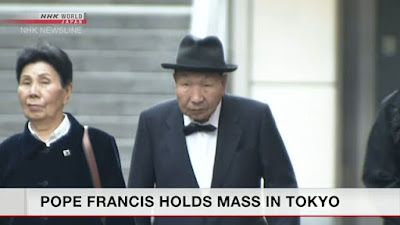A former Japanese professional boxer who spent 48 years in prison for murders he says he did not commit was among some 50,000 people greeting Pope Francis as he entered Tokyo Dome stadium to celebrate Mass on Monday.
Iwao Hakamada, who converted to Catholicism during his decades on death row, was invited to the Mass and was there with his sister, organizers said.
Hakamada, 83, was released from prison in 2014 because of new DNA evidence. He has become a symbol of a movement to oppose the death penalty in Japan.
Francis decreed the death penalty "inadmissible" last year, in a change to the Catholic teachings called Catechism.
Hakamada was in the crowd as Francis waved and kissed babies while circling the crowd in his vehicle ahead of the service.
It was a moment of vindication for Hakamada. His supporters and lawyers say he was a victim of a criminal system that relies so heavily on forced confessions that it is called "hostage justice."
Hakamada confessed to the murders but asserted his innocence when his trial began. He had been questioned, beaten and bullied by police for more than 10 hours daily without an attorney present, official documents show.
Hakamada was convicted of the 1966 murder of his boss at a soy bean paste maker and the man's wife and 2 children. He was sentenced to death in 1968.
In 2014, a court found Hakamada should be given a retrial based on new DNA tests and released him. That ruling was overturned by a higher court last year, which questioned the DNA tests. The case is now before the Supreme Court.
"He has been on death row for so long. He is still on death row," his sister, Hideko Hakamada, told a crowd that gathered recently to discuss the death penalty at the Parliament building in Tokyo.
"I am filled with joy he came back to me alive," she said, choking back tears.
She noted her brother was "not yet back to normal" and prone to delusions because of the trauma of prison.
Japan, the United States and South Korea are the only nations in the OECD group of developed economies that have the death penalty. The U.S. in recent years has carried out executions in only a handful of states. South Korea has not had one in more than a decade. Japan carried out 15 executions last year, up from 4 the year before.
One of the judges who convicted Hakamada acknowledged later that he had serious questions about the case from the start.
The police presented as evidence blood-stained clothing found in the vats of soy bean paste, although the vats had been thoroughly searched before.
The judge with misgivings attempted suicide over his feelings of guilt. He was later baptized and took the same baptismal name as Hakamada's, Paulo, and added Miki, the name of a Japanese martyr.
Other boxers have come out in support of Hakamada.
"I pray to Jesus Christ and appeal for my innocence from 9 until 10:30 every night. During this prayer time, I can be free from suffering. Thanks to God's love and blessing, I exist and cry for the truth and walk toward tomorrow," Hakamada wrote while in prison.
Mario Marazziti, co-founder of the World Coalition Against the Death Penalty, who is in Japan during Francis' visit, expressed hope the pope can "inspire Japan" to start rethinking the death penalty.
"Capital punishment always adds another death to one already inflicted," Marazziti said.
"It is a lie told to the families of the victims. It promises justice and promises healing from pain. Instead it freezes resentment and leaves people spending years waiting for revenge."
Public opinion polls show a majority of Japanese favors the death penalty.
The Catholic community in Japan, the nation's lawyers' federation and some legislators are pushing to abolish capital punishment. Some are calling for a moratorium on executions during 2020, the year of the Tokyo Olympic Games.
Source: The Mainichi, Staff, November 25, 2019
⚑ | Report an error, an omission, a typo; suggest a story or a new angle to an existing story; submit a piece, a comment; recommend a resource; contact the webmaster, contact us:
deathpenaltynews@gmail.com.
Opposed to Capital Punishment? Help us keep this blog up and running! DONATE!
"One is absolutely sickened, not by the crimes that the wicked have committed,
but by the punishments that the good have inflicted." -- Oscar Wilde












